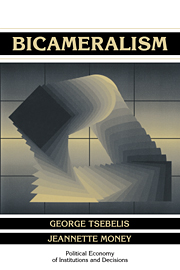Book contents
- Frontmatter
- Contents
- List of tables and figures
- Series editors' preface
- Acknowledgments
- Introduction
- PART I THE HISTORY AND GEOGRAPHY OF BICAMERAL DIVERSITY
- PART II MODELS OF BICAMERAL INSTITUTIONS
- PART III EMPIRICAL STUDIES OF BICAMERALISM AND IMPLICATIONS
- Introduction to Part III
- 6 The outcomes of intercameral bargaining
- 7 The process of intercameral bargaining
- 8 Conference committees
- 9 Implications
- Conclusions
- References
- Index
7 - The process of intercameral bargaining
Published online by Cambridge University Press: 02 December 2009
- Frontmatter
- Contents
- List of tables and figures
- Series editors' preface
- Acknowledgments
- Introduction
- PART I THE HISTORY AND GEOGRAPHY OF BICAMERAL DIVERSITY
- PART II MODELS OF BICAMERAL INSTITUTIONS
- PART III EMPIRICAL STUDIES OF BICAMERALISM AND IMPLICATIONS
- Introduction to Part III
- 6 The outcomes of intercameral bargaining
- 7 The process of intercameral bargaining
- 8 Conference committees
- 9 Implications
- Conclusions
- References
- Index
Summary
In this chapter we evaluate the assumptions underlying the model of intercameral bargaining developed in Chapter 4. We do so by analyzing six laws passed by the French legislature between 1971 and 1981. In Chapter 4 we argued that impatience to reach agreement drives bicameral bargaining and that impatience is generated by a number of factors: the desire of legislators to be viewed as efficient, the need to resolve fiscal or political crises, and the concern that legislators will defect from the political coalition supporting the bill. Moreover, we concluded that the relative power of each house in bicameral legislatures is a function of institutional constraints and the impatience of each legislature to reach a deal. In this chapter, we examine the assumption that impatience for legislative outcomes (1) drives the negotiating process and (2) determines the outcomes of bicameral negotiations in France (within the limits set by institutional constraints). As in Chapter 6, because we focus such attention on a single country, we also address the relevant French legislative analyses on relative house power. One explanation of senatorial power, expertise, is common to many countries, as noted in Chapter 1. The second explanation, presidential politics, is peculiar to France.
We proceed by defining the concept of impatience and our approach to operationalizing that concept. We then briefly present the two alternative models of French legislative behavior against which we pitch our own. In the third section, we evaluate the three competing hypotheses in light of six pieces of legislation. The detailed examination of the bills as they shuttle from one chamber to the other allows us to focus on the process of bicameral negotiations.
- Type
- Chapter
- Information
- Bicameralism , pp. 145 - 175Publisher: Cambridge University PressPrint publication year: 1997

